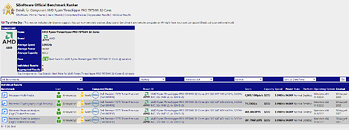T0@st
News Editor
- Joined
- Mar 7, 2023
- Messages
- 3,063 (3.88/day)
- Location
- South East, UK
| System Name | The TPU Typewriter |
|---|---|
| Processor | AMD Ryzen 5 5600 (non-X) |
| Motherboard | GIGABYTE B550M DS3H Micro ATX |
| Cooling | DeepCool AS500 |
| Memory | Kingston Fury Renegade RGB 32 GB (2 x 16 GB) DDR4-3600 CL16 |
| Video Card(s) | PowerColor Radeon RX 7800 XT 16 GB Hellhound OC |
| Storage | Samsung 980 Pro 1 TB M.2-2280 PCIe 4.0 X4 NVME SSD |
| Display(s) | Lenovo Legion Y27q-20 27" QHD IPS monitor |
| Case | GameMax Spark M-ATX (re-badged Jonsbo D30) |
| Audio Device(s) | FiiO K7 Desktop DAC/Amp + Philips Fidelio X3 headphones, or ARTTI T10 Planar IEMs |
| Power Supply | ADATA XPG CORE Reactor 650 W 80+ Gold ATX |
| Mouse | Roccat Kone Pro Air |
| Keyboard | Cooler Master MasterKeys Pro L |
| Software | Windows 10 64-bit Home Edition |
A pair of Dell Precision workstations have been tested in SiSoftware's Sandra benchmark suite—database entries for the 7875 Tower (Dell 00RP38) and 7875 Tower (Dell 00RP38) reveal specifications of next generation AMD Ryzen Threadripper Pro CPUs. The 32 core 7975WX model was outed a couple of weeks ago, but the Sandra benchmark database has been updated with additional scores. Its newly leaked sibling is getting a lot of attention—the recently benchmarked 7995WX sample appears to possess 96 Zen 4 cores, and 192 threads (via SMT) with a 5.14 GHz maximum single-core boost clock. Tom's Hardware is intrigued by benchmark data showing that the CPU has: "a 3.2 GHz all-core turbo frequency."
There are 12 CCDs onboard, with a combined total of 384 MB of L3 cache (each CCD has access to 32 MB of L3)—therefore Wccftech believes that "this chip is based on the Genoa SP5 die and will adopt the top 8-channel and SP5 socket platform. The chip also features 96 MB of L2 cache and the top clock speed was reported at 5.14 GHz." The repeat benched Ryzen Threadripper Pro 7975WX CPU is slightly less exciting—with 32 Zen 4 cores, 64 threads, 128 MB of L3 cache, and 32 MB of L2 cache. According to older information, this model is believed to have a TDP rating of 350 W and apparent clock speeds peaking at 4.0 GHz—Wccftech reckons that this frequency reflects an all-core boost. They have produced a bunch of comparative performance charts and further analysis—well worth checking out.



View at TechPowerUp Main Site | Source
There are 12 CCDs onboard, with a combined total of 384 MB of L3 cache (each CCD has access to 32 MB of L3)—therefore Wccftech believes that "this chip is based on the Genoa SP5 die and will adopt the top 8-channel and SP5 socket platform. The chip also features 96 MB of L2 cache and the top clock speed was reported at 5.14 GHz." The repeat benched Ryzen Threadripper Pro 7975WX CPU is slightly less exciting—with 32 Zen 4 cores, 64 threads, 128 MB of L3 cache, and 32 MB of L2 cache. According to older information, this model is believed to have a TDP rating of 350 W and apparent clock speeds peaking at 4.0 GHz—Wccftech reckons that this frequency reflects an all-core boost. They have produced a bunch of comparative performance charts and further analysis—well worth checking out.



View at TechPowerUp Main Site | Source




